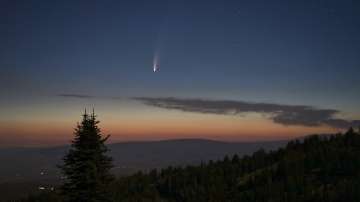Space watchers and enthusiasts discovering space, astronomy and happening of celestial events now have the opportunity to witness Comet NEOWISE for a period of almost 20 days. Starting from July 14, C/2020 F3 (also called NEOWISE), a comet discovered on March 27, will be clearly visible in the north-western sky. It will be visible after sunset for around 20 minutes for the next 20 days. People can observe it from naked eyes, Deputy Director, Pathani Samanta Planetarium in Odisha has informed.
When will Comet NEOWISE or C/2020 F3 will be closest to earth
NEOWISE comet discovered by NASA on March 27, will be nearest to earth on July 22. NEOWISE comet which takes around 6,800 years to complete one round around its orbit, on July 22 will be at a distance of 103 million kilometers (64 million miles) from Earth.
Comet NEOWISE current location
A grab taken from site spacein3d shows the current location or position of comet NEOWISE.
According to Space3d.com, Comet NEOWISE is currently at 128,788,194 kms (80,025,274 miles) away from earth. The comet is getting 51 kms (31.7 miles) close to earth every second. The comet will pass at a distance of 183,492 kms (114,017 miles) from our planet.
Comet NEOWISE can be seen using binoculars, small telescope
Comet C/2020 F3 photographed low in the morning sky on July 7.
Comet NEOWISE will be easily visible using binoculars or a small telescope if the sky remains clear. NASA said, "As of July 7, the comet was easily seen through binoculars, with some observers able to see it with unaided eyes."
